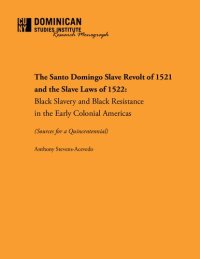
Ebook: The Santo Domingo Slave Revolt of 1521 and the Slave Laws of 1522: Black Slavery and Black Resistance in the Early Colonial Americas (Sources for a Quincentennial)
- Series: Dominican Studies Research Monograph Series
- Year: 2019
- Publisher: CUNY Dominican Studies Institute
- City: New York, NY
- Language: English
- pdf
From the foreword:
"1) Makes available the first ever English translation of the pioneering 1522 ordinances on Black peoples of La Española. The translation of the laws into English offers non-Spanish literate scholars and students direct access to the contents of these early colonial slavery laws, opening the door to further analyses from a diverse range of disciplines;
2) Presents the first line-by-line paleographic transcription of the archival manuscripts of the laws, making the exact wording of the text of the ordinances now readable for those interested in the document as it appears in its original language;
3) Provides clear images of the manuscripts containing the laws that until now have been only accessible online to those who are familiar navigating PARES, the digital database of Spanish documents;
4) Of f ers the fi rst comprehensive historical analysis published in English or Spanish about these laws following two objectives: deciphering the sixteenth-century Spanish legalese and contextualizing the laws, which were provoked by local circumstances in La Española at the end of the first quarter of the 1500s;
5) Provides an overview of (a) how Dominican historiography has addressed the earliest known colonial slavery laws of the Americas as they were conceived and issued in La Española; and (b) how the English-language scholarship has (or has not) engaged the Dominican scholarship and/or the laws and the rebellion;
6) Makes easier the comparison of Gonzalo Fernández de Oviedo’s 1535 interpretation, the earliest comments in the historiography of both events, with the original text of the 1522 laws;
7) Settles once and for all, after years of intense research that included the revisions of both primary and secondary sources and direct consultation with specialists on late-medieval and early-modern archival manuscripts, the ambiguities of the past scholarship about the date of the enslaved African Blacks’ uprising that caused the creation of these ordinances. Establishing the specific date of the rebellion paves the way for a more accurate account of these historical events, including understanding how African Blacks enslaved people managed to carry out an action that would threaten the slavery system in the Americas."
"1) Makes available the first ever English translation of the pioneering 1522 ordinances on Black peoples of La Española. The translation of the laws into English offers non-Spanish literate scholars and students direct access to the contents of these early colonial slavery laws, opening the door to further analyses from a diverse range of disciplines;
2) Presents the first line-by-line paleographic transcription of the archival manuscripts of the laws, making the exact wording of the text of the ordinances now readable for those interested in the document as it appears in its original language;
3) Provides clear images of the manuscripts containing the laws that until now have been only accessible online to those who are familiar navigating PARES, the digital database of Spanish documents;
4) Of f ers the fi rst comprehensive historical analysis published in English or Spanish about these laws following two objectives: deciphering the sixteenth-century Spanish legalese and contextualizing the laws, which were provoked by local circumstances in La Española at the end of the first quarter of the 1500s;
5) Provides an overview of (a) how Dominican historiography has addressed the earliest known colonial slavery laws of the Americas as they were conceived and issued in La Española; and (b) how the English-language scholarship has (or has not) engaged the Dominican scholarship and/or the laws and the rebellion;
6) Makes easier the comparison of Gonzalo Fernández de Oviedo’s 1535 interpretation, the earliest comments in the historiography of both events, with the original text of the 1522 laws;
7) Settles once and for all, after years of intense research that included the revisions of both primary and secondary sources and direct consultation with specialists on late-medieval and early-modern archival manuscripts, the ambiguities of the past scholarship about the date of the enslaved African Blacks’ uprising that caused the creation of these ordinances. Establishing the specific date of the rebellion paves the way for a more accurate account of these historical events, including understanding how African Blacks enslaved people managed to carry out an action that would threaten the slavery system in the Americas."
Download the book The Santo Domingo Slave Revolt of 1521 and the Slave Laws of 1522: Black Slavery and Black Resistance in the Early Colonial Americas (Sources for a Quincentennial) for free or read online
Continue reading on any device:

Last viewed books
Related books
{related-news}
Comments (0)